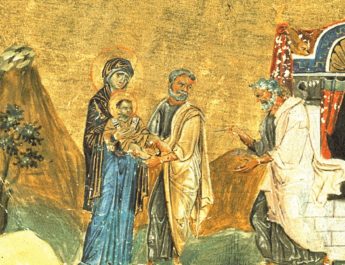1 John 2:7-14
Wednesday of Holy Week – A Women’s Lectionary
7 Beloved,A I am writingB you no newC commandment,D
A “beloved” = agapetos. From agape (love, goodwill, benevolence; God’s divine love); from agapao (to love, take pleasure in, esteem; to prefer). This is Beloved or very dear one. It is a title for the Messiah, but also for Christians. Properly, this is one who personally experiences God’s love.
B “writing” = grapho. This is to write or describe. It is where the word “graphic” comes from.
C “new” = kainos. This is not new as in new versus old. This is new in the sense of novel, innovative, or fresh.
D “commandment” = entole. From entellomai (to charge, command, give orders or instructions) {from en (in, on, at, by, with) + tellomai (to accomplish); {from telos (an end, aim, purpose, completion, end goal, consummation, tax; going through the steps to complete a stage or phase and then moving on to the next one)}}. This is an order, command, ordinance, or law. It focuses on the purpose of the command and its end result.
but an oldE commandment that you have had from the beginning;F the old commandment is the wordG that you have heard.H
E “old” = palaios. 19x in NT. From palai (former, of old); probably from palin (back, again, further). This is old, ancient, or worn out.
F “beginning” = arche. From archomai (to begin or rule); from archo (to rule, begin, have first rank or have political power). Properly, this is what is first. In a temporal sense, that is beginning or origin. It can also refer to the one who ranks first, i.e. king or ruler. So, it can also be magistrate, power, or principality. It can be used more generally for what is preeminent.
G “word” = logos. From lego (to speak, tell, mention). This is word, statement, speech, analogy. It is a word that carries an idea or expresses a thought, a saying. It could refer to a person with a message or reasoning laid out in words. By implication, this could be a topic, line of reasoning, or a motive. It can be used for a divine utterance or as Word – Christ.
H “heard” = akouo. This is hear or listen, but it also means to understand by hearing. This is where the word “acoustics” comes from.
8 Yet I am writing you a new commandment that is trueI in him and in you, because the darknessJ is passing awayK
I “true” = alethes. From a (not) + lanthano (concealed, hidden, unnoticed; to shut one’s eyes to, unwittingly, unawares). This is true, unconcealed; true because it is in concert with fact and reality – attested. Literally, what cannot be hidden; truth stands up to test and scrutiny and is undeniable, authentic.
J “darkness” = skotia. 16x in NT. From skotos (darkness literal or figurative – as moral or spiritual darkness, sin and what comes from it; obscurity); from skia (shadow, thick darkness, outline; figurative for a spiritual situation that is good or bad). This is darkness or dimness. Figuratively, it can be a spiritual darkness. This is obscurity in a literal or figurative sense.
K “passing away” = parago. 11x in NT. From para (by, beside, in the presence of, alongside) + ago (to lead, bring, carry, guide, go, drive). This is to lead near or by, to pass by, go along, be a passer-by.
and the trueL lightM is already shining.N
L “true” = alethinos. Related to “true” in v8. From alethes (see note I above). This is literally made of truth – that which is true or real, authentic. Something that is true from its source and has integrity.
M “light” = phos. From phao (to shine or make visible, especially with rays of light); from the same as phaino (to bring light, cause to appear, shine, become visible or clear). This is light, a source of light, fire, or radiance. This is light with specific reference to what it reveals. It is luminousness whether natural or artificial, abstract or concrete, literal or figurative.
N “shining” = phaino. Related to “light” in v8. See note M above.
9 Whoever says,O “I am in the light,” while hatingP aQ brotherR or sister, is still in the darkness.
O “says” = lego. Related to “word” in v7. See note G above.
P “hating” = miseo. From misos (hatred). This word is used in two ways in the New Testament. One has to do with how we prioritize. In order to prioritize something the highest, it means we have to rank other things lower. We cannot have 10 number one priorities. So, the nine that are not number 1, we love less or we value them lower. We make a moral choice the springs from our values about where we put our time, efforts, energy, etc. The other way is detesting or hatred as we normally think of it. This sense has a particular affinity with persecuting the one we hate.
Q Literally, “his.”
R “brother” = adelphos. From a (with, community, fellowship) + delphus (womb). This is a brother in a literal or figurative sense. It is also used of another member of the Church.
10 Whoever lovesS a brother or sister livesT in the light, and in such a person there is no cause for stumbling.U
S “loves” = agapao. Related to “beloved” in v7. See note A above.
T “lives” = meno. This is to stay, remain, wait, await, continue, abide, endure. It can mean to literally stay in a place or to remain in a condition or to continue with hope and expectation.
U “cause for stumbling” = skandalon. 15x in NT. Perhaps from kampto (to bend or bow). This is a stumbling block, offense, hindrance, or scandal. Properly, this is the part of the trap that triggers it shut on the victim. So, as a snare, it is anything that causes error or offense, something that makes one stumble or traps someone. This is where the word “scandal” comes from.
11 But whoever hates anotherV believerW is in the darkness, walksX in the darkness,
V Literally, “his.”
W “believer” = adelphos. Same as “brother” in v9. See note R above.
X “walks” = peripateo. From peri (about, concerning, around, encompassing) + pateo (to read, trample on; to trample literally or figuratively); {from patos (trodden) OR from paio (to strike, smite, sting; a hit like a single blow)}. This is to walk. Going from Hebrew figurative language, to walk referred to how you conducted your life, how you chose to live. This word is most literally walking around. Figuratively, it is living, behaving, following, how you occupy yourself. This is where “peripatetic” comes from.
and does not knowY the way to go,Z because the darkness has brought on blindness.AA
Y “know” = eido. This is to know, consider perceive, appreciate, behold, or remember. It means seeing with one’s eyes, but also figuratively, it means perceiving – seeing that becomes understanding. So, by implication, this means knowing or being aware.
Z “go” = hupago. Related to “passing away” in v8. From hupo (by, under, under the authority of) + ago (see note K above). This is to lead under so to depart, go away, or die. It is to lead away under the command of someone else, being given a mission or objective to carry out.
AA “brought on blindness” = tuphloo + ho + ophthalmos + autos. Literally, “blinded his eyes.” Tuphloo is 3x in NT. From tuphlos (blind or a blind person – perhaps in the sense of smoke making things opaque and impossible to see; blind literally or figuratively); from tuphoo (to be conceited, foolish, puffed up, haughty; properly, to blow smoke; figuratively being muddled or cloudy in mind; poor judgment that harms spiritual clarity; also, being covered with smoke – so filled with pride); from tuphos (smoke, vanity, arrogance); from tupho (to raise smoke, smolder, slowly consume without flame). This is to blind in a physical or spiritual sense – obscured vision. Ophthalmos is from optanomai (to appear, be seen by). This is eye or sight. It is used figuratively for the mind’s eye, a vision, or for envy.
12 I am writing to you, little children,BB
because your sinsCC are forgivenDD on account of his name.EE
BB “little children” = teknion. 8x in NT– 1x in John and 7x in 1 John. From teknon (child, descendant, or inhabitant); from tikto (to beget, bring forth, produce). This is the diminutive of teknon, so little child. Figuratively, it refers to someone who is loved, endeared, a darling. It is also used for Christian converts.
CC “sins” = hamartia. From hamartano (to miss the mark, do wrong, make a mistake, sin); {from a (not) + meros (a part or share)}. Literally, this means not having one’s share or portion – like not receiving inheritance or what was allotted to you. This word means missing the mark so it is used for guilt, fault, and acts of sin.
DD “forgiven” = aphiemi. From apo (from, away from) + hiemi (to send). This is send away, release, permit, forgive, allow to depart, discharge, or send forth.
EE “name” = onoma. May be from ginosko (know, recognize, learn from firsthand experience). This is a name, authority, cause, character, fame, reputation. The name was thought to include something of the essence of the person so it was not thought to be separate from the person.
13 I am writing to you, fathers,FF
because you knowGG him who is from the beginning.
I am writing to you, young people,HH
because you have conqueredII the evilJJ one.
FF “fathers” = pater. This is father in a literal or figurative sense. Could be elder, senior, ancestor, originator, or patriarch.
GG “know” = ginosko. Related to “name” in v12. See note EE above.
HH “young people” = neaniskos. 11x in NT. From neanias (youth, young man; someone in their prime to the age of 40); from neos (young, new, youth, person). This is a youth or young man in their prime up to 40.
II “conquered” = nikao. From nike (victory, conquest; figurative for what makes one successful). This is to have victory, overcome, conquer, or prevail. It implies a victory that follows a battle. This root is part of “Nicodemus’s” name and it is also the root where Nike comes from.
JJ “evil” = poneros. From poneo (to toil); related to ponos (pain, trouble, labor, distress, suffering; toil, which implies anguish); from the base of penes (a laborer, poor person, starving or indigent person; someone who works for their living); from pernomai (working for a living; laborer, poor person; to work for daily bread); from peno (to toil to survive day by day). This is bad, evil, wicked, malicious, grievous, or toilsome. Properly, it is something that bears pain – it emphasizes the miseries and pains that come with evil. By contrast, the Greek kakos refers to evil as part of someone’s core character. Also contrasting the Greek sapros, which deals with falling away from a previously embodied virtue. This word can mean ill, diseased, morally culpable, derelict, vicious, malicious, or guilt. It can also refer to the devil or sinners.
14 I write to you, children,KK
because you knowLL the Father.
I write to you, fathers,
because you knowMM him who is from the beginning.
I write to you, young people,
because you are strongNN
and the word of GodOO abidesPP in you,
and you have overcomeQQ the evil one.
KK “children” = paidion. Related to “walks” in v11. From pais (child, youth, servant, slave); perhaps from paio (see note X above). This is a child as one who is still being educated or trained. Perhaps one seven years old or younger. Used figuratively for an immature Christian.
LL “know” = ginosko. Same as “know” in v13. See note GG above.
MM “know” = ginosko. Same as “know” in v13. See note GG above.
NN “strong” = ischuros. From ischuo (to be strong, healthy and vigorous, able, have power, prevail; strength that engages a resisting force); from ischus (strength, might, power, force, ability; power that engages immediate resistance). This is strong – first of physical strength. Later, also used figuratively for forcible, powerful, mighty, vehement, or sure.
OO “God” = Theos. From Proto-Indo-European origins, meaning do, put, place. This is God or a god in general.
PP “abides” = meno. Same as “lives” in v10. See note T above.
QQ “overcome” = nikao. Same as “conquered” in v13. See note II above.
Image credit: “Love” by Pascal Maramis, 2012.




